Bereaved parents whose children were crushed to death in their classrooms during the earthquake in Sichuan province have turned mourning ceremonies into protest events in recent days, forcing officials to address a growing political backlash over shoddy construction of public schools.
Parents of the estimated 10,000 children who lost their lives in the quake have grown so enraged about collapsed schools that they have overcome their usual caution about confronting Communist Party officials. Many say they are especially upset that some schools for poor students crumbled into rubble even though government offices and more elite schools not far away survived the quake largely intact.
On Tuesday, an informal gathering of parents in Dujiangyan (都江堰) to commemorate their children gave way to unbridled fury. One of the fathers in attendance, a quarry worker named Liu Lifu, grabbed the microphone and began calling for justice. His 15-year-old daughter, Liu Li, had died along with her entire class during a biology lesson.
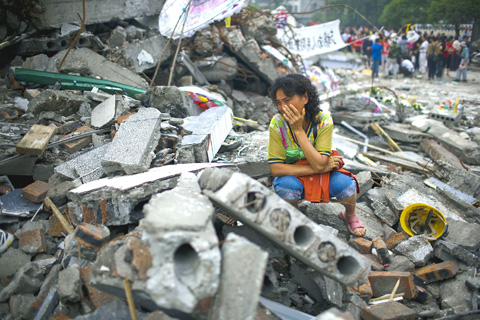
PHOTO: NY TIMES NEWS SERVICE
“We demand that the government severely punish the killers who caused the collapse of the school building,” he shouted. “Please, everyone sign the petition so we can find out the truth.”
The crowd grew more agitated. Some parents said that local officials had known for years that the school was unsafe but refused to take action. Others recalled that two hours passed before rescue workers showed up; even then, they stopped working at 10pm the night of the earthquake and did not resume the search until 9am the next day.
In the end more than 200 bodies were recovered from the school. “The people responsible for this should be brought here and have a bullet put in their head,” said Luo Guanmin, a farmer who was cradling a photo of her 16-year-old daughter, Luo Dan.
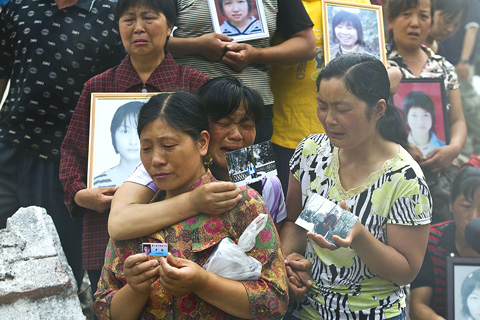
PHOTO: NY TIMES NEWS SERVICE
Sharp confrontations between protesters and officials began over the weekend in several towns in northern Sichuan. Hundreds of parents whose children died at the Fuxin No. 2 Primary School in the city of Mianzhu staged an impromptu rally on Saturday. They surrounded one female official who tried to assure them that their complaints were being taken seriously, screaming and yelling in her face until she fainted.
The next day, the Communist Party’s top official in Mianzhu (綿竹) came out to talk with the parents and stop them from marching to Chengdu, the largest city in the region, where they sought to prevail on higher level authorities to investigate. The local party boss, Jiang Guohua, dropped to his knees and pleaded with them to abandon the protest, but the parents shouted in his face and continued their march.
The protests threaten to undermine the government’s attempts to promote its response to the quake as effective and to highlight heroic rescue efforts by the People’s Liberation Army, which has dispatched 150,000 soldiers to the region. Censors have blocked detailed reporting of the schools controversy from the state-run media, but a photo of Jiang kneeling before protesters has become a sensation on some Web forums, bringing national attention to the incident.
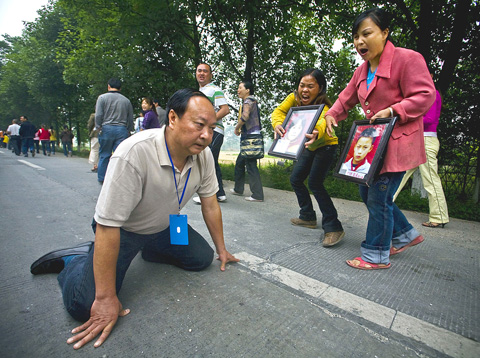
PHOTO: NY TIMES NEWS SERVICE
One of China’s boldest magazines, the business journal Caijing (財經), used its main commentary article in its latest issue to call on the government to step up investigations of shoddy school construction. Xinhua, the official news agency, also issued a commentary saying a speedy official response is warranted.
The authorities in Beijing appear to recognize the delicacy of the issue. On Monday, a spokesman for the Education Ministry, Wang Xuming, promised a reassessment of school buildings in quake zones, adding that those responsible for cutting corners on school construction would be “severely punished.”
Local officials across Sichuan have also bowed to the pressure.
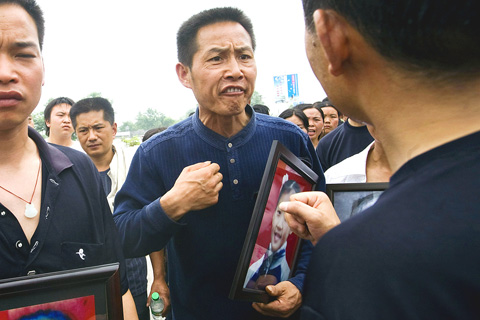
PHOTO: NY TIMES NEWS SERVICE
In Beichuan (北川), officials announced an investigation into the collapse of a middle school there that killed 1,300 children. Reached by phone on Tuesday, two provincial officials in Chengdu vowed a vigorous response, although they suggested that full-scale investigations should take a backseat to the needs of survivors.
“We are not officially investigating the quality problems in school buildings, but we definitely will, after we finish the temporary lodging for refugees,” said Tian Liya, the party secretary of the Sichuan Construction Bureau’s emergency department.
Gauging from the outbursts of recent days, any delay will only embolden infuriated parents. In their confrontation with Communist Party officials last Saturday, the parents encircled the vice secretary of the Mianzhu city government and called her a liar for her report on the destruction of the Fuxin school that failed to mention that 127 students had been killed.
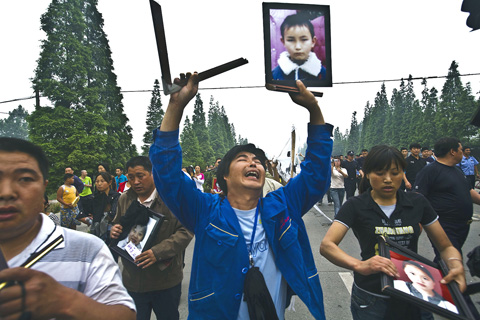
PHOTO: NY TIMES NEWS SERVICE
“Why can’t you do the right things for us?” they shouted. “Why do you cheat us?” For the next 20 minutes they yelled and screamed in her face until she passed out and had to be carried away by an aide.
The next day, the parents directed their ire at Jiang. When his answers proved unsatisfying, they began their march to Chengdu. Jiang dropped to the ground several times and begged them to stop. “Please believe the Mianzhu Party committee can resolve the issue,” he said. They kept walking.
Three hours later, the police tried to intervene. During the ensuing struggle, the broken glass from the pictures of dead children left several parents bleeding. After a tense standoff, the marchers agreed to board government buses that brought them to Deyang, the county seat. There, they met with the vice mayor, who promised he would start an investigation the following day.
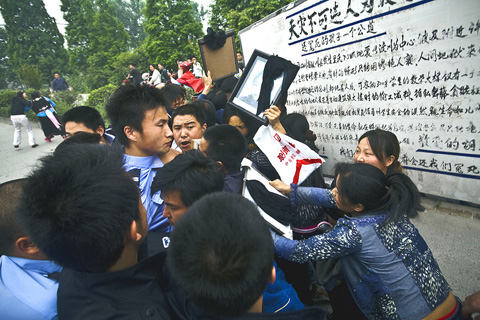
PHOTO: NY TIMES NEWS SERVICE
“I hope you can be free from this mood of sadness,” Zhang Jinming, the vice mayor, said before sending them away. “The government will make a research team and give you a satisfying result.”
The parents who lost their children at Juyuan Middle School say they have yet to hear from Dujiangyan officials. A few parents said they had been approached by teachers and told they would be well-compensated for their loss — about US$4,500 per child — if they would stop their increasingly vociferous public campaign.
“We don’t want their money, we just want this corruption to end,” said Luo, the farmer, as others nodded in agreement. Many parents said they felt insulted that no one from the school or the government had come to offer their condolences.
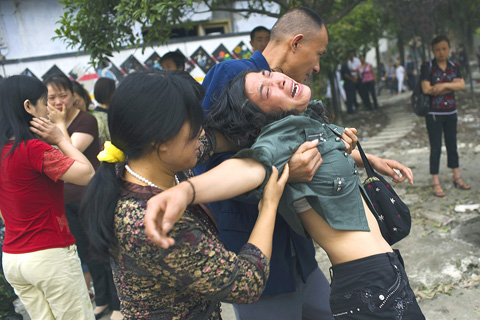
PHOTO: NY TIMES NEWS SERVICE
The only official presence at Tuesday’s gathering in Dujiangyan was a pair of tanker trucks full of disinfectant, which arrived just at the start of the ceremony. As the parents began lighting candles and incense, a worker directed his hose at the mountain of rubble. The strong smell of bleach drifted over the crowd. Then, perhaps sensing the potential for confrontation, the workers drove away.
The parents were told to group themselves according to their children’s classes, and as they lined up they numbly exchanged stories of loss. “When they pulled my boy out he kept begging for water but then he died,” said Wang Chaoping, holding a passport-sized photo of his 16-year-son, Wang Tinghai. “He wasn’t the best student, but he loved sports.”
Some parents came hugging framed photographs and dogeared achievement awards, placing them on the spot where their sons and daughters died under heaps of broken concrete. The men set off fireworks to chase away evil spirits as wads of paper money smoldered amid the rubble.
Then a dirge began playing over the loudspeaker, and all at once the women doubled over in agony, a chorus of 100 mothers wailing over the loss of an only child. The husbands wept in silence, paralyzed by the storm of emotion.
“We worked so hard to raise you, and then you left us so suddenly,” a woman screamed, pounding the ruins of the Juyuan Middle School with her fists. “How could you leave us to grow old alone?”
The parents whose children attended Juyuan were mostly farmers and factory workers, and the harshness of their lives, and their loss, was etched in their faces. Many, like Li Ping, 43, said they had lived frugally in order to pay obligatory fees for meals and a bed in the dormitory, which withstood the quake with nary a crack.
“I put all my hope in my one child,” said Li, who has been unable to work because of chronic liver disease. “They were supposed to support us in old age.” He started to well up but then stopped himself. “We’re not asking the government for money,” he said. “We just want them to tell us why they died.”

Behind a car repair business on a nondescript Thai street are the cherished pets of a rising TikTok animal influencer: two lions and a 200-kilogram lion-tiger hybrid called “Big George.” Lion ownership is legal in Thailand, and Tharnuwarht Plengkemratch is an enthusiastic advocate, posting updates on his feline companions to nearly three million followers. “They’re playful and affectionate, just like dogs or cats,” he said from inside their cage complex at his home in the northern city of Chiang Mai. Thailand’s captive lion population has exploded in recent years, with nearly 500 registered in zoos, breeding farms, petting cafes and homes. Experts warn the

No one saw it coming. Everyone — including the Chinese Nationalist Party (KMT) — expected at least some of the recall campaigns against 24 of its lawmakers and Hsinchu Mayor Ann Kao (高虹安) to succeed. Underground gamblers reportedly expected between five and eight lawmakers to lose their jobs. All of this analysis made sense, but contained a fatal flaw. The record of the recall campaigns, the collapse of the KMT-led recalls, and polling data all pointed to enthusiastic high turnout in support of the recall campaigns, and that those against the recalls were unenthusiastic and far less likely to vote. That

The unexpected collapse of the recall campaigns is being viewed through many lenses, most of them skewed and self-absorbed. The international media unsurprisingly focuses on what they perceive as the message that Taiwanese voters were sending in the failure of the mass recall, especially to China, the US and to friendly Western nations. This made some sense prior to early last month. One of the main arguments used by recall campaigners for recalling Chinese Nationalist Party (KMT) lawmakers was that they were too pro-China, and by extension not to be trusted with defending the nation. Also by extension, that argument could be

Aug. 4 to Aug. 10 When Coca-Cola finally pushed its way into Taiwan’s market in 1968, it allegedly vowed to wipe out its major domestic rival Hey Song within five years. But Hey Song, which began as a manual operation in a family cow shed in 1925, had proven its resilience, surviving numerous setbacks — including the loss of autonomy and nearly all its assets due to the Japanese colonial government’s wartime economic policy. By the 1960s, Hey Song had risen to the top of Taiwan’s beverage industry. This success was driven not only by president Chang Wen-chi’s